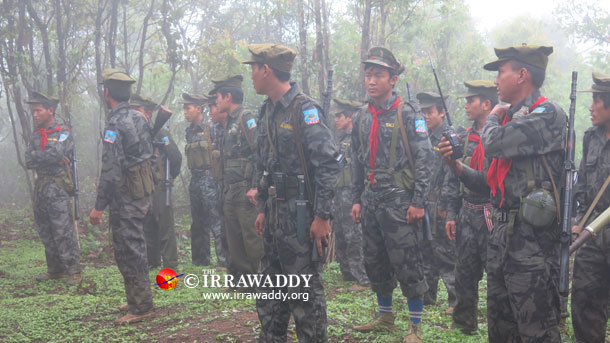RANGOON — About a week after the government offered 17 ethnic armed groups a nationwide ceasefire proposal, one group—the ethnic Palaung—has stated that they reject the conditions set out in the draft agreement.
In early November, ethnic groups convened in Laiza to develop a joint position in their ceasefire negotiations with Naypyidaw. On Nov. 5, at a high-profile meeting in the Kachin capital Myitkyina, Minister Aung Min’s peace negotiations team met with Burma’s major rebel groups and handed them a draft ceasefire agreement.
The high-level talks marked a significant step towards resolving Burma’s decades-old ethnic conflict, but the sides still disagreed on numerous issues.
Ethnic groups have long demanded greater political autonomy for their regions and control over local natural resources. The integration of ethnic armed units into one federal military is another key discussion point between the sides.
On Wednesday, the Ta’ang National Liberation Army (TNLA), a rebel group based in the northern part of Shan State, said they would not agree to the government’s ceasefire proposal.
“We all need to disarm, according to their draft agreement. Then, they [the government] will hold a political dialogue if we respect their draft agreement. It will be difficult for our ethnic groups to agree to disarm,” TNLA Col Ta Phone Kyaw said.
“For our group, we totally reject this draft,” he told The Irrawaddy.
A copy of the draft agreement proposed by the government asks the ethnic groups to form political parties and to disarm before political dialogue can start.
The TNLA and the Kachin Independence Army (KIA) are the last two major ethnic armed groups that have not signed a ceasefire agreement with the government. President Thein Sein’s reformist government has begun talks with many rebel groups since 2012 and has signed 14 ceasefire agreements.
The TNLA, which is believed to have about 1,500 soldiers, have been engaged in regular clashes with the Burma Army in northern parts of Shan State in the past year. The TNLA has met for several rounds of ceasefire talks with the government, but no agreement was reached.
In a statement released on Tuesday, the United Nationalities Federal Council (UNFC), an alliance of several ethnic armed groups, said the meeting with Minister Aung Min in Myitkyina had “strengthened trust to a certain extent.”
The UNFC said it had informed the government that it would study the nationwide ceasefire proposal and discuss it with the leaders of their respective organizations.
The TNLA said clashes with the Burma Army were still continuing, adding that on Nov. 5-7 deadly gun battles fighting occurred in Kutkai Township. Skirmishes recently also broke out in Namkham and Nansan townships.
Ta Phone Kyaw said his troops were under sustained attacks as Burma Army units tried to conquer its Kutkai rebel base.
“They destroyed our guerrilla base. They shot artillery both in the morning and night. There was heavy fighting whenever they try to climb the mountain where we are based,” he said.
“We could not meet again with them to negotiate because there is more fighting in our area,” Ta Phone Kyaw added.
Hla Maung Shwe, a senior advisor at the government-affiliated Myanmar Peace Center, said communication between the government and the TNLA had broken down recently.
He added that the government had been pre-occupied with preparations for another round of nationwide ceasefire talks in the Karen State capital Hpa-an next month.
“We have a plan to meet them [the TNLA] in November. But, we are now busy with preparations for another meeting in Hpa-an. But, they [TNLA] did not even contact us about this meeting,” Hla Maung Shwe said.

















